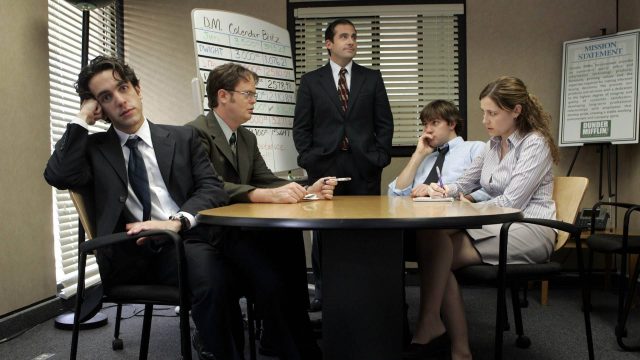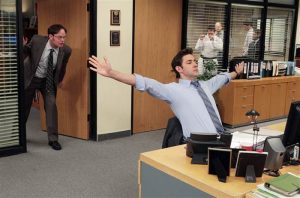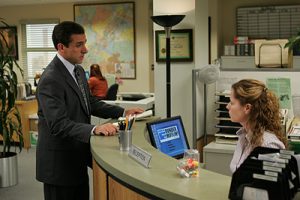
The Office: Utopia in Dystopia
Office spaces are often connected to ideas of structure, routine, and monotony. Reflecting on this image of the office, the British created the original mockumentary series The Office. The show portrays the day-to-day lives of the corporate workers at a regional branch of a somewhat defunct paper company called Dunder Mifflin. The show translates the banality of the work place into comedy– and for the British, comedy that is rather tragic. While the British version creates a sense of darkness around corporate life, the American remake frames corporate life in a far lighter tone. Yet, hidden beneath the comedy and humor is a desire for a better world that breaks free of the demands imposed by the office. Although the show never directly spells out a utopian world for the audience, its dystopian concept and frequent utopian impulses compel us to imagine one.
The Office that is portrayed by the British is nothing short of ruthless boredom to the point that it is often unbearable to watch. While the show seems to be a dark satire[1], the series is actually a very realist re-representation of modern corporate work life. Ricky Gervais, both the creator and star of the British show, drew most of his inspiration for the show from his eight years of office experience. In fact, the manager of The Office, David Brent, was also based off of people who Ricky had met throughout his life — humans who were vulnerable, insecure, and desperate for fame[2]. In the office, David’s desire to receive approval from his co-workers is a focal point of humor, but it is also a reflection of his hopeless aspiration for fame. The difference between his lived reality and his unmatched desires evokes sympathy from audiences who understand the caustic nature of corporate life. The lives of everyone in the office is tragic — David never reaches fame, Tim never finds true love, Dawn never becomes an illustrator — and that is exactly what Ricky wanted to communicate. Corporate life is dystopian. The more dreadful the office, the more the audience repulsed corporate life. The British audience was left yearning for an anti-corporate world.
Yet, rather than leaving audiences lamenting about the dystopian corporate world, the American version of The Office provides audiences with a version of corporate life that is far more reassuring and entertaining. Where David Brent uses comedy to garner power and respect[3], Michael Scott uses humor to make friends and entertain them. For Michael, the office is a space that focuses on the people far more than the work. To strengthen bonds with his co-workers, Michael constantly hosts events — birthday parties, shopping sprees, casino nights, ship cruises, beach games– to foster a greater sense of community in the office. At one point, Michael confides in us, “The people that you work with are, when you get down to it, your very best friends.” (VII, xxi) In focusing on the people and the fun in the office, Michael often fails to maintain clear structure in the space, upending conventional images of oppressive corporate life. Michael transforms a traditionally bleak corporate office into an inclusive community, making audiences believe that corporate life isn’t that terrible, after all. That is, while the British version portrays corporate life to be hopeless and dystopian, the American version sugarcoats corporate life and frames it to be reassuring and positive.

On the surface, the American version seems very different from the British version — the workers bond with each other and Michael creates a community among his co-workers. However, the playful culture of the office in the American version only conceals the dystopian issues at hand. Many of the office workers are intensely dissatisfied with their jobs and yearn for very different lives. In the pilot episode, Jim Halpert, one of the salesmen in the office, complains about how bored he is even by talking about his job. Yet soon after, Jim gets a kick out of pranking his co-worker Dwight by sticking his stapler in Jell-O, suggesting that Jim enjoys his time in the office quite more than he professed. In fact, throughout his time in the office, Jim frequently designs elaborate pranks and deeply invests himself in office activities (such as creating the Office Olympics or hosting parties) that we forget that he was bored by his job. These activities, however, are only an illusion of enjoyment. Jim buries his discontentment with his job, using foolish activities as an outlet for his frustration in the office. In an regular day in the office, in attempt to prank co-worker Dwight, Jim creates a character for himself in the video game “Second Life”, an online virtual world where players can develop an alternative life[4]. When Jim shows the character he designed for himself to Pam, he accidentally reveals his dream self — a sportswriter in Philadelphia who plays the guitar. We understand that Jim’s “second life” is his dream life, and it is far different from his reality as an ordinary office salesman. Although he does not often voice it directly, Jim is desperate to get away from his office job. Through most of the show, Jim is left with an aura of unfulfilled potential and lost hope, where he cannot realize his vision of becoming a sportswriter. It is Jim’s despairing state that compels audiences to fantasize about a utopian world where workers can break free of their cubicles and pursue their dreams.
It is the absence of utopia in The Office that evokes the utopian vision. The employees never break free of the office, but the show frequently hints at the utopian impulses to do so. Pam Beesley, is another visionary employee like Jim. Her job as secretary and receptionist of the office demands only low-level skills and a basic level of literacy and writing. Pam’s use of office supplies as an artistic outlet is a constant reminder of her desire to abandon her repetitive and uncreative corporate job[5]. Pam is so dissatisfied with her job that, in finding out about the potential downsizing of the office, she admits that she would be fine if she was let go. “I don’t think it’s many little girls’ dreams to be a receptionist. I like to do illustrations. Mostly watercolor, some oil pencils.” Yet Pam’s dreams of becoming a visual artist are constrained by her very mundane corner office job. Michael is constantly asking Pam to engage in low-skill jobs despite her potential for much more meaningful work. On a day when the office is preparing for a day at the beach, Michael approaches Pam at her desk and tells her, “I want you to write down everything that people are doing all day and type it up in a way that is helpful. Alright?” (III, xxii) Michael again reminds Pam of her status in the office, trapping her into a task that asks of lowly skills. After the conversation, a dispirited Pam confesses, “I have the most boring job in the office, so why wouldn’t I have the most boring job on beach day?” Pam is constantly put down by the obligations of corporate capitalist work and discouraged from engaging in the creative work she desires. Pam’s life is framed by the dystopian office. In seeing Pam tied down to her unfulfilling job, The Office taps into our anger at the suppression of the capitalist society, and begs audiences to imagine a different world in which people can escape capitalist structures fulfill their potential in personally meaningful work.

In the American show, the undercurrent of this utopian vision is constantly reinforced with Pam’s direct confrontations and attempts to liberate herself from her corporate cells. On beach day, Michael challenges his employees to walk across a pit of scorching coals as a way of selecting the next potential regional manager. When no one volunteers, Pam prepares to make an attempt, but Michael turns her down and tells her she needs to take notes for the group. Later, Pam makes the coal walk despite Michael’s own inability to do. Pam’s walk is a sign of her defiance against the office demands and refusal to be suppressed any longer. “Michael, you couldn’t even do that. Maybe I should be your boss.” Pam directly suggests an upending of the unjust corporate structure which she had been subjugated to for many years. She eventually takes action to pursue her artistic aspirations by attending art school in New York, finally fulfilling her dreams. The vision of breaking free of the corporate structure is finally realized for both Pam and the audience. Yet, a few episodes later, Pam ends up returning to Dunder Mifflin and falling back into the corporate structure. Although Pam’s escape is unsuccessful, her attempt to liberate herself from the the office offers a utopia of the escape from the restrictions of the capitalist society and pursuit of true fulfillment.
Regardless of office status, managers and employees alike wish to be fulfilled in personally meaningful ways beyond corporate walls. A decade after the last show of the British version of The Office aired, Ricky Gervais made a follow up episode that updated audiences with David Brent’s life since Dunder Mifflin. “He’s cashing a few penchants, because he’s never giving up the dream of being a rockstar… and he’s put together a band of mercenary session musicians.” Even the manager of the original Dunder Mifflin has dreams beyond the capitalist-constraints that he wants to pursue. Even though David is not particularly successful, his attempt at his musical dreams hint at the vision of a corporate-free world. Although not directly drawn out, the utopian vision of pursuing one’s dreams is inherent in the spirit of the show.
Even the most mundane material for entertainment — office life — leads audiences to consider an alternative, more desirable version of the world. Although the British and American versions have distinct ways of approaching utopia, both evoke a strong sense of the better world. Although the lives of Dunder Mifflin employees do not match up to their hopes, audiences are fantasizing about a world in which potential was fulfilled and dreams were not stifled. It is the absence of, or attempts at, a utopia in The Office, that creates a sense of the utopia.
Bibliography
Beeden, Alexandra, and Joost De Bruin. “The Office.” Television & New Media 11, no. 1 (06, 2009): 3-19. doi:10.1177/1527476409338197.
Detweiler, Eric. ““I Was Just Doing a Little Joke There”: Irony and the Paradoxes of the Sitcom in The Office.” The Journal of Popular Culture 45, no. 4 (07, 2012): 727-48. doi:10.1111/j.1540-5931.2012.00955.x.
Gervais, Ricky. “Ricky Gervais on Why Life in ‘The Office’ Is Like Reality TV.” The Wall Street Journal. July 18, 2011. https://blogs.wsj.com/speakeasy/2011/07/18/ricky-gervais-on-why-life-in-the-office-is-like-reality-tv/.
“Second Life.” Wikipedia. November 17, 2017. https://en.wikipedia.org/wiki/Second_Life.
Agencies, Staff And. “Slough Stationers Beat New York’s Finest.” The Guardian. January 26, 2004. https://www.theguardian.com/media/2004/jan
[1] Agencies, Staff And. “Slough Stationers Beat New York’s Finest.” The Guardian. January 26, 2004. https://www.theguardian.com/media/2004/jan/26/broadcasting.uknews.
[2]Gervais, Ricky. “Ricky Gervais on Why Life in ‘The Office’ Is Like Reality TV.” The Wall Street Journal. July 18, 2011. https://blogs.wsj.com/speakeasy/2011/07/18/ricky-gervais-on-why-life-in-the-office-is-like-reality-tv/.
[3]Beeden, Alexandra, and Joost De Bruin. “The Office.” Television & New Media 11, no. 1 (06, 2009): 3-19. doi:10.1177/1527476409338197.
[4]“Second Life.” Wikipedia. November 17, 2017. https://en.wikipedia.org/wiki/Second_Life.
[5] Detweiler, Eric. ““I Was Just Doing a Little Joke There”: Irony and the Paradoxes of the Sitcom in The Office.” The Journal of Popular Culture 45, no. 4 (07, 2012): 727-48. doi:10.1111/j.1540-5931.2012.00955.x.